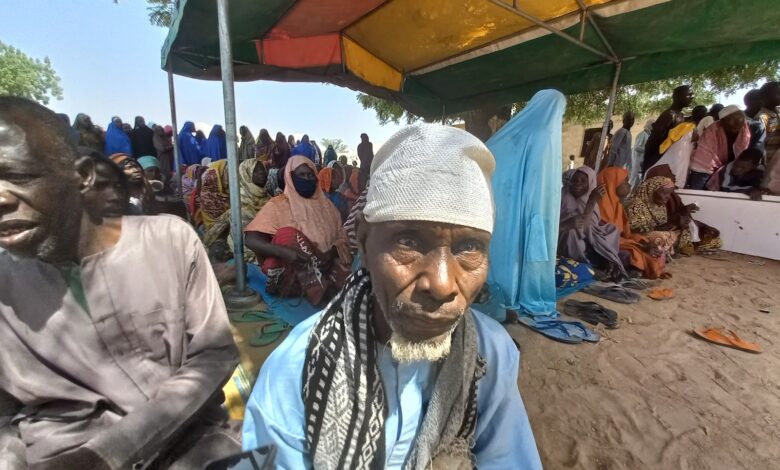IDPs Face Water, Food Scarcity Despite Intervention
Internally Displaced Persons in Borno's Gubio Camp wallow in the agony of starvation and poor sanitation.

Internally displaced persons (IDPs) in Gubio camp located in Maiduguri, the capital of Borno state in the Northeast of Nigeria, face sanitation challenges and lament food scarcity, despite the government’s food aid intervention last month.
When the state’s emergency management agency made its first food distribution in the camp in nearly a year, however, the quantity of food distributed, which comprised 400 bags of maize and a hundred bags of beans, was considered inadequate compared to the camp’s population of 4,419 households.
“For God’s sake, how could anyone think that the 500 bags of maize and beans that were distributed to the entire population in the camp would last beyond a day,” said Babagana Tijjani, an IDP from Gamboru-Ngala local government area in central Borno.
He laments that each household got a bowl of grains and a household composed of at least six persons. According to Tijjani, since then, they have not received aid support either from the state government or the NGOs,”.
Musa Idris, from the Kukawa local government in northern Borno, and one of the camp’s leaders, complained that apart from the prevailing hunger crisis, there are also more significant water shortage problems and poor hygiene in the camp.
He said most of the makeshift toilets had been filled up while some had blown off during a rainstorm.
“It is over five months now since the toilets were evacuated, and this is posing a serious threat to health, especially during this rainy season,” he said.
“It was the IOM that used to help evacuate the toilets at the end of the month. But with the government embargo on their operation in the camp, they have seized coming to do the needful.
Idris said the water supply at the camp had also reached a crisis level as most of the solar system-dependent boreholes had broken down.
“We don’t even know how to confront the myriad of challenges plaguing us in this camp. And we are very surprised that the government and the NGOs still feel indifferent about our plight here in Gubio camp.”
Gubio IDP camp is situated on the outskirts of Maiduguri. It hosts IDPs from Abadam, Kukawa, Monguno, Nganzai, Maiduguri, Jere, Bama, Konduga, Marte, Ngala, Kala Balge and Gwoza local government areas.
Tijjani, who had spoken on behalf of his displaced kinsmen from Gamboru Ngala near the border with Cameroon, said all they wanted from the government was to release them to return to their communities.
“All that we beg of the governor is to release us from this bondage and let us go home. It is better to be at home no matter how unsafe it is than to be here and die of hunger. We are tired of burying our fellow IDPs who die almost daily due to hunger and lack of medical care for their hunger-induced ailments” he said.
The Governor of Borno state, Babagana Zulum, had in June 2021 listed Gubio camp as one of the centres hosting IDPs to be shut down in line with the government’s policy on returning and resettling IDPs and refugees in their former communities or other locations such as the local government headquarters.
The state has since facilitated the return of thousands of people to rehabilitated towns such as Malam Fatori in northern Borno and Kirawa in the southern axis of the state.
However, the closure of the remaining camps in Maiduguri had been halted due to paucity of funds, according to a government official who wouldn’t want to be named in this report.
Support Our Journalism
There are millions of ordinary people affected by conflict in Africa whose stories are missing in the mainstream media. HumAngle is determined to tell those challenging and under-reported stories, hoping that the people impacted by these conflicts will find the safety and security they deserve.
To ensure that we continue to provide public service coverage, we have a small favour to ask you. We want you to be part of our journalistic endeavour by contributing a token to us.
Your donation will further promote a robust, free, and independent media.
Donate HereStay Closer To The Stories That Matter




